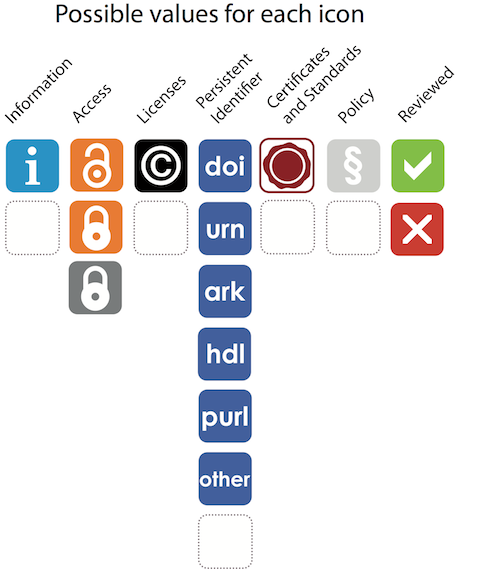Earlier this week re3data.org – the Registry of Research Data Repositories – officially launched. The registry is nicely described in a preprint also published this week.
re3data.org offers researchers, funding organizations, libraries and publishers and overview of the heterogeneous research data repository landscape. Information icons help researchers to identify an adequate repository for the storage and reuse of their data.
I really like re3data.org, and that is not because I personally know several of the people involved in this project, or because they cited this blog in their preprint. I think that we are just at the beginning of building the infrastructure needed for research data management, and re3data.org fills an important need. In my opinion it is not enough to provide lists of research data repositories, we need additional information that can help guide researchers in selecting an appropriate research data repository. re3data.org has addressed this nicely by providing a vocabulary for the registration and description of research data repositories, and by creating a simple icon system:

Possible values for each icon. From https://doi.org/10.7287/peerj.preprints.21v1
Future directions I would like re3data.org to take include:
- Training and education. Researchers probably pick research data repositories mainly based on the familiarity of the repository within their community rather than the criteria developed by re3data.org. A lot more training and education is needed before researchers understand the importance of persistent identifiers, licenses and other criteria.
- Integration. re3data.org can make it easier to integrate into existing scientific infrastructure, e.g. by using persistent identifiers such as DOIs for research data repositories, or by providing an API that makes it easier for other services to integrate re3data.org.
- Governance. Whether or not scientific infrastructure such as re3data.org is accepted and used by the community depends on many factors, and governance is one of the most important ones. re3data.org should seek the support of other organizations, in particular from outside Germany. A governing board, re3data.org as an independent organization, and strategies to coordinate with similar efforts such as Databib are possible strategies.
References
Pampel H, Vierkant P, Scholze F, et al. Making Research Data Repositories Visible: The Re3data.Org Registry. PeerJ PrePrints; 2013. doi:10.7287/peerj.preprints.21v1
Vierkant P, Spier S, Ruecknagel J, et al. Vocabulary for the Registration and Description of Research Data Repositories. re3data.org. Published online 2012:374 kb, 23 pages. doi:10.2312/RE3.002


